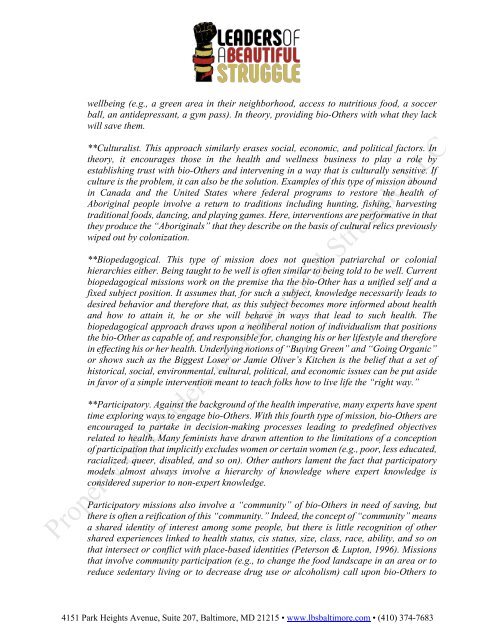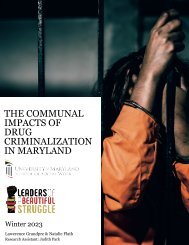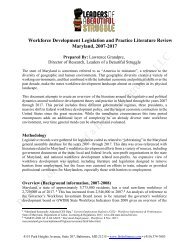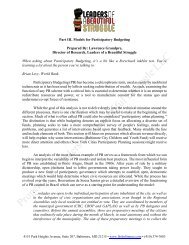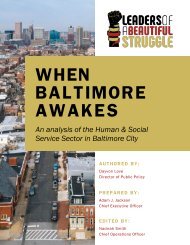Drug Decriminalization in Maryland Through an African Centered Research Paradigm- Analysis and Recommendations
This document offers guidance for theorizing questions related to a proposed research project purposed to advance drug decriminalization in Maryland.
This document offers guidance for theorizing questions related to a proposed research project purposed to advance drug decriminalization in Maryland.
- No tags were found...
Create successful ePaper yourself
Turn your PDF publications into a flip-book with our unique Google optimized e-Paper software.
wellbe<strong>in</strong>g (e.g., a green area <strong>in</strong> their neighborhood, access to nutritious food, a soccer<br />
ball, <strong>an</strong> <strong>an</strong>tidepress<strong>an</strong>t, a gym pass). In theory, provid<strong>in</strong>g bio-Others with what they lack<br />
will save them.<br />
**Culturalist. This approach similarly erases social, economic, <strong>an</strong>d political factors. In<br />
theory, it encourages those <strong>in</strong> the health <strong>an</strong>d wellness bus<strong>in</strong>ess to play a role by<br />
establish<strong>in</strong>g trust with bio-Others <strong>an</strong>d <strong>in</strong>terven<strong>in</strong>g <strong>in</strong> a way that is culturally sensitive. If<br />
culture is the problem, it c<strong>an</strong> also be the solution. Examples of this type of mission abound<br />
<strong>in</strong> C<strong>an</strong>ada <strong>an</strong>d the United States where federal programs to restore the health of<br />
Aborig<strong>in</strong>al people <strong>in</strong>volve a return to traditions <strong>in</strong>clud<strong>in</strong>g hunt<strong>in</strong>g, fish<strong>in</strong>g, harvest<strong>in</strong>g<br />
traditional foods, d<strong>an</strong>c<strong>in</strong>g, <strong>an</strong>d play<strong>in</strong>g games. Here, <strong>in</strong>terventions are performative <strong>in</strong> that<br />
they produce the “Aborig<strong>in</strong>als” that they describe on the basis of cultural relics previously<br />
wiped out by colonization.<br />
**Biopedagogical. This type of mission does not question patriarchal or colonial<br />
hierarchies either. Be<strong>in</strong>g taught to be well is often similar to be<strong>in</strong>g told to be well. Current<br />
biopedagogical missions work on the premise tha the bio-Other has a unified self <strong>an</strong>d a<br />
fixed subject position. It assumes that, for such a subject, knowledge necessarily leads to<br />
desired behavior <strong>an</strong>d therefore that, as this subject becomes more <strong>in</strong>formed about health<br />
<strong>an</strong>d how to atta<strong>in</strong> it, he or she will behave <strong>in</strong> ways that lead to such health. The<br />
biopedagogical approach draws upon a neoliberal notion of <strong>in</strong>dividualism that positions<br />
the bio-Other as capable of, <strong>an</strong>d responsible for, ch<strong>an</strong>g<strong>in</strong>g his or her lifestyle <strong>an</strong>d therefore<br />
<strong>in</strong> effect<strong>in</strong>g his or her health. Underly<strong>in</strong>g notions of “Buy<strong>in</strong>g Green” <strong>an</strong>d “Go<strong>in</strong>g Org<strong>an</strong>ic”<br />
or shows such as the Biggest Loser or Jamie Oliver’s Kitchen is the belief that a set of<br />
historical, social, environmental, cultural, political, <strong>an</strong>d economic issues c<strong>an</strong> be put aside<br />
<strong>in</strong> favor of a simple <strong>in</strong>tervention me<strong>an</strong>t to teach folks how to live life the “right way.”<br />
**Participatory. Aga<strong>in</strong>st the background of the health imperative, m<strong>an</strong>y experts have spent<br />
time explor<strong>in</strong>g ways to engage bio-Others. With this fourth type of mission, bio-Others are<br />
encouraged to partake <strong>in</strong> decision-mak<strong>in</strong>g processes lead<strong>in</strong>g to predef<strong>in</strong>ed objectives<br />
related to health. M<strong>an</strong>y fem<strong>in</strong>ists have drawn attention to the limitations of a conception<br />
of participation that implicitly excludes women or certa<strong>in</strong> women (e.g., poor, less educated,<br />
racialized, queer, disabled, <strong>an</strong>d so on). Other authors lament the fact that participatory<br />
models almost always <strong>in</strong>volve a hierarchy of knowledge where expert knowledge is<br />
considered superior to non-expert knowledge.<br />
Participatory missions also <strong>in</strong>volve a “community” of bio-Others <strong>in</strong> need of sav<strong>in</strong>g, but<br />
there is often a reification of this “community.” Indeed, the concept of “community” me<strong>an</strong>s<br />
a shared identity of <strong>in</strong>terest among some people, but there is little recognition of other<br />
shared experiences l<strong>in</strong>ked to health status, cis status, size, class, race, ability, <strong>an</strong>d so on<br />
that <strong>in</strong>tersect or conflict with place-based identities (Peterson & Lupton, 1996). Missions<br />
that <strong>in</strong>volve community participation (e.g., to ch<strong>an</strong>ge the food l<strong>an</strong>dscape <strong>in</strong> <strong>an</strong> area or to<br />
reduce sedentary liv<strong>in</strong>g or to decrease drug use or alcoholism) call upon bio-Others to<br />
4151 Park Heights Avenue, Suite 207, Baltimore, MD 21215 • www.lbsbaltimore.com • (410) 374-7683


